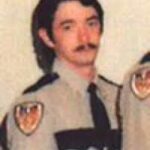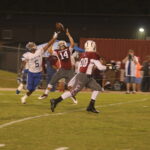Cavat Bass does not like to make a big deal out of it because that’s not his nature, but he has made history within the Covington Police Department during his 25 years on the job.
He became the first African-American lieutenant in 1993. A few years later he became the first African-American captain and is now the first African-American assistant chief.
Rather than publicize his laurels, he prefers to offer up his accomplishments as an example of what young people can accomplish, regardless of their race or social status.
“It’s very important to try and leave a legacy or to pave the way for some people who may think because of who they are they’re not able to excel in life,” Bass says. “To teach through example.”
Bass, a 50-year-old married father of two adult children, didn’t originally plan on making a living in law enforcement. He wanted to be a high school teacher and coach.
But then he saw his older brother, Ricky Bass, become a police officer.
“I wanted to follow in his footsteps,” Bass says.
So the native of Whiteville, Tenn., applied to become a police officer in Covington in 1990 and he has now spent more than half of his life in law enforcement.
Even though policemen have been heavily criticized over the past few years, making the job tougher than ever, he still has young people ask him about becoming a cop.
“I had a young person the other day ask if we were hiring,” Bass says. “He said, ‘I want to be just like you. I like the uniform.'”
Bass said he doesn’t discourage people from entering his profession, but he feels compelled to ask their intentions.
“You have to have your heart in it,” Bass says. “Don’t become an officer for the wrong reasons. I would encourage somebody to do it to make the community better and leave a legacy for those who come behind them. To restore lives instead of destroy lives.”
Dealing with young people has been a large part of his job. He was a school resource officer at Covington High School for 12 years and was the first SRO in the Tipton County school system.
Just the other day he saw some kids walking home from the store who threw their garbage on the ground.
“I said, ‘Young men, this is your community. You’re littering on your community. How about putting the paper in the proper place?’ They looked at me for a minute, but they did it. I was very proud they did that.”
Bass, like other members of law enforcement, has noticed how things have changed the last decade or so. He understands how some young officers have their guard up when patrolling, and he feels that too. But he tries to mingle with the community.
“Society has changed,” Bass says. “People were more officer friendly. You could walk the community more, talk to neighbors. Most times you try and stay in your car through the community because you never know who’s targeting you because of the lack of respect for an officer as a whole. I can understand some of the young officers the way they approach the job. Sometimes officers put up their defense, because at the end of the day everybody wants to go home to their family. Hopefully through building relationships you can diffuse some of that.”
Through it all, Bass still says he’s a people person, something that he believes is crucial for law enforcement.
“You’ve got to love people. You’ve got to have the attitude that you want to help people and all the things that come with that. We have to unite together and stand with the community … I’ve seen a lot, I’ve been through a lot and I’ve learned a lot. Throughout 25 years of doing this, I still feel safe in this community.”





Leave a Reply